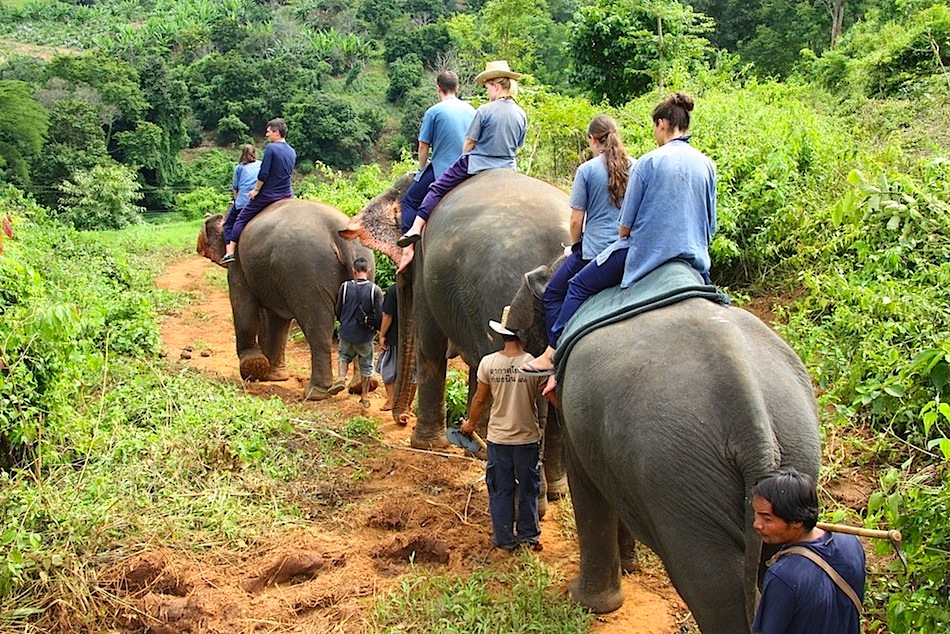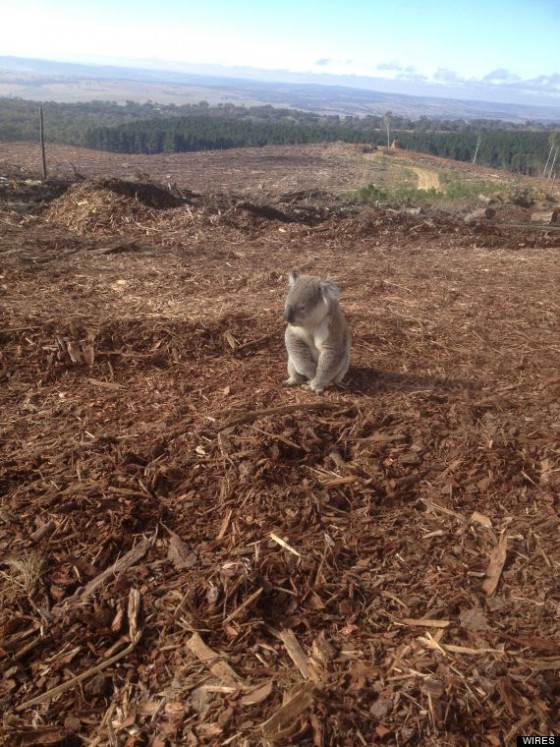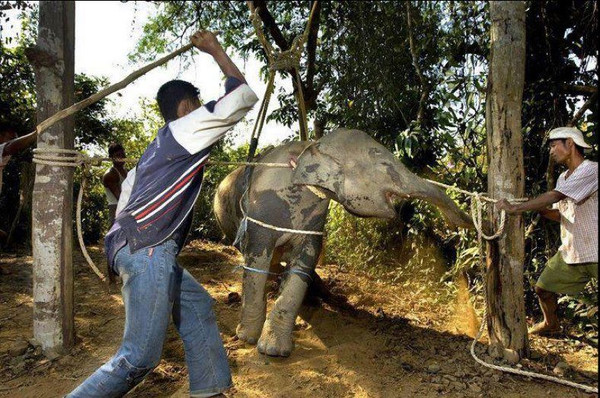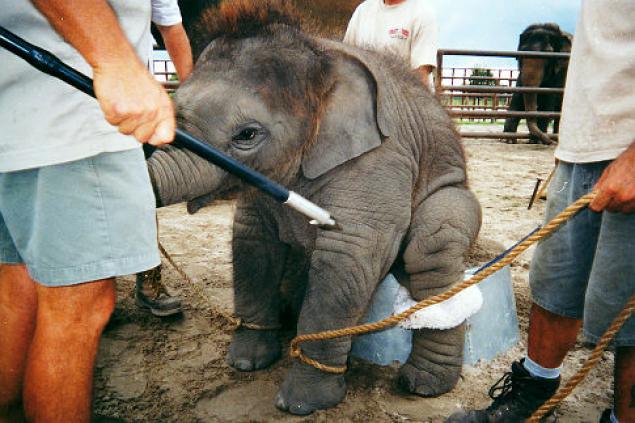
It’s the one thing that every one asks when you visit somewhere like Thailand: “Did you ride the elephants?”. It seems that it’s the number one thing on everyone’s list when they arrive. So when I first decided to take part in a documentary about elephant trekking, I was somewhat sceptical about what I was actually going to find. I mean, if so many people take part every year surely it can’t be that bad?
Because I worked in comedy and I’m relatively young to be doing this type of thing, we decided that the documentary wouldn’t really work if I was to stand in front of the camera like some amateur David Attenborough and try and reel off a load of facts that I really have no idea about. So as planned I boarded that plane with the crew with no idea about what happens in order for millions of people to ride on an elephant’s back every year.
It took a grand total of about four hours into the flight for me to see the first advertisement for a family trip to a elephant camp. At the time I thought nothing of it, now however I see it in a different light.
The first day of filming I found out what really happens. Baby elephants are taken away from their mother at a ridiculously young age and tortured and starved for days, even weeks, until they give up hope and stop fighting. Only then do the ‘trainers’ start to slowly feed them for each trick they perform, or clean the wounds they have inflicted. As someone that is constantly thinking of the next joke or wise crack to say to entertain people, my defence against the surge of emotion I felt seeing this was to make light of the situation. For the first time in my life, I was lost for words.
For the next few days I was absolutely fuming, to everyone I interviewed or spoke to I must apologise, it must have felt like they were being interrogated, I guess I was simply looking for someone to blame. Unfortunately there is no one to blame, no singular person to catch and throw in jail, because we are all guilty in some way of aiding this horrific practise. A few days in we visited Phuket Zoo (please never visit this place, it’s the worst place I’ve ever been), we spoke to a couple and at the time I didn’t realise that their interview is probably the most important part of the documentary.
They were a young couple from New Zealand on holiday and we saw them ride an elephant for a photo. When I told them about the torture they gave completely opposite opinions. The woman was horrified, almost moved to tears by what I told her. The guy on the other hand gave the exact answer I wanted – his words were “I’ve heard about that but these elephants are already here, so it wont make a difference will it?”, Yes my friend, yes it would.
You see a large amount of tourists visit these camps and zoos with absolutely no idea of what goes on for them to be able to ride these animals and that needs to change. There is also the small percentage of people that will go to these places and not care about the cruelty, all they see is their photo opportunity. Tourists will play a huge part in changing this practice; I want people to feel ashamed of where they have been and what they have done, I’m hoping that one day very soon someone will upload a picture of their feet resting on the back of a young elephant’s head and get a terrible reaction.
When I say we are all guilty of aiding this practice I don’t mean people have intentionally not cared about this subject, what I mean is that we all have a friend or relative that has uploaded a picture to Facebook or Twitter of themselves riding an elephant and we’ve most probably liked or shared it. Unfortunately every time someone likes/shares or comments on one of these photos it is making it that little bit more acceptable and means that it will continue to happen.
Unsurprisingly none of the camp owners would talk to us, they haven’t got the stones to stand in front of a camera and tell the world why they are torturing wild animals for entertainment I guess. We did however get to talk to a few Mahouts/trainers and I was surprised to find that I did actually like a lot of them, most of them cared deeply for their elephants and didn’t want to have them ridden by tourists, however it’s either that or live on the street with their family and an expensive to keep elephant. And yes I know that people out there will go with the line of “how dare we humans think we can keep an animal like this simply for a job!” However please come back with that when you are living on the street with a family to feed and no income, it’s not quite that simple.
Then we get to the sanctuaries, BLES owned by Katherine Connor and Elephant Nature Park owned by Lek Chailert. If I was to swap lives with anyone in the world it would probably be these two. Lek showed us around her sanctuary which was simply amazing. I’ve always been impressed by people who are so focused on reaching a specific goal and Lek epitomised this, everywhere we went people were interested in what we were doing, asking questions and watching (as people do with a film crew), Lek on the other hand could not have cared less that we were there, she wanted to sit with her ‘family’ and spend time bonding, singing and taking care of them, it really did take my breath away.
Katherine on the other hand completely blew me away, I had no idea who I was going to meet and I couldn’t have been more surprised. I got out of the car and saw our director talking to this woman so I walked over and introduced myself. Straight away she started talking about one of her elephants that was sick and needed to go to the hospital, I didn’t listen to a word she said. I found myself watching her, wondering how this woman from England who was smart, pretty, funny and successful dropped everything she had to move to a country where she didn’t speak the language, to take care of one sick elephant. To this day I’m still impressed by her.
The thing that I think I learnt the most from my experience is that, while people blame the travel companies, the mahouts and the camp owners it’s us the tourists that are the reason this practise exists, as without the demand there is no business. There is no point in trying to get these businesses to change their ways, yes one or two may stop but others will continue, what needs to happen is that there needs to be a stigma attached to elephant riding in the same way there is poaching.
If you are thinking of visiting Thailand or any of the countries that do this in future, the sanctuaries need all the help they can get out there and I think it’s down to people like us to visit them, help them out and finally, for once and for all, end this horrific practice.
Check out Joe Keogh’s documentary, An Elephant Never Forgets
By Joe Keogh
www.right-tourism.com
Is It Cool To Care? Elephants, Tigers and Taking Stick…
It’s been a while since I last wrote anything regarding animal welfare. It’s something that I think about pretty much every day but despite the fact that my previous article was posted in the RIGHT-tourism ‘Experts’ section, I’m not one, in fact far from it.
So I only ever really feel the need to put pen to paper and write something when I am particularly annoyed at a certain issue. Last time it was elephants used in tourism but this time it’s more of a general worry about a few things.
I got a bit of stick for my last post, much from people who have no idea what they are talking about, one twitter user decided to tell me that my article was wrong and ‘her sister said the elephant camp was amazing’. Aside from the fact that she obviously doesn’t understand the concept of an opinion, the article couldn’t have been wrong due to me writing what I felt when I was there, however it bothered me hugely. Not because my work was being criticized but because of the level of ignorance it must have taken to write that comment.
There seems to be this belief that because we can hold tools and use our brains to a higher level than the rest of the animals on this planet (most of us), that we should be allowed to decided the fate of every living thing.
A friend of mine sent me the belove picture over the Christmas period, a koala stood in what used to be a forest before the trees were cut down for logging. Now I know that a lot of these pictures are used and aren’t true but it got to me, though it was obviously used to shock people into thinking his home had been destroyed, it worked.
I sat staring at the picture for a good few minutes and it brought me back to something I said in the documentary we made (still available!). Ignorance is bliss. It’s true, the woman who sent me that comment on twitter had no idea what a trekking camp is like as she had never been herself, but chose to argue with me because she didn’t want to admit someone in her family had done something wrong. She hadn’t done anything wrong of course, but no one wants to be told they aided in the torture of animals, so she struck out against the facts.
Unfortunately there also seems to be a divide between the people fighting for animal welfare in this world and those who don’t seem to care, but I don’t think that is entirely correct. The majority of people do care at least a little bit, but one of the problems I’ve noticed is that the people who really care tend to devote their lives to it, work with animals are vegetarian/vegan and so on. A lot of people want to know about the problems but without having it rammed in their faces.
I’ve checked my Facebook on numerous occasions and been horrified to see that someone has shared a video of an animal in a horrific state with the caption “YOU ARE HELPING THIS HAPPEN”. In a way most of us do, I’m not a vegetarian and have no intention of being, so no doubt some way down the line the meat I’m eating when digging into one of my steaks hasn’t been treated in the best way, I accept that and try to counter it by buying the best I can.
That however does not mean you should feel bad, at all. I’ve been an animal lover all my life, much of the time I actually prefer the company of an animal to another person (less annoying) and by eating meat you aren’t doing something ‘bad’. Spending your holiday going on a hunting trip to kill a lion is bad. Going to watch a whale in a tiny tank do tricks when you know full well that isn’t right, is bad.
I feel that we alienate too many people who are willing to help the change by telling them they have done something wrong and accusing them of being cruel. The point is as hard as anyone works, nothing will ever change unless it is as a collective and that can’t happen until we all have the same goal. Now is the time to hold our hands up and say “damn we really messed up, lets fix it”.
Beyond words
I feel like I’m smashing my head against a wall when I talk about people going to ride elephants or view tigers in Asia. It’s coming to that time of year when people are starting to book trips to some of the countries that use this form of entertainment to bring in millions of tourists anually.
Someone I know came back from Thailand not too long ago and got in touch with me to say that they had seen my documentary and article and then proceeded to tell me that everything I said was true (like I need telling), they told me that they went to the camps, zoos and Tiger Temple simply to “see how bad it was”.
Now I can’t believe I actually have to say this but there must be something I’m missing here, the reason we do this work is so that you know the facts and can make an educated descision when going to these countries. I’m not here to tell anyone what to do but the majority of people will read this and think it’s best to stay away! But for the select few out there please just take my word for it, the camps, zoos, tiger temples and pretty much anything else that includes animals in tourism are not nice places to go and you will regret it!
Is it cool to care?
When I first got back from filming our documentary I was mercilessly taken the mick out of by a select group of friends who really have no interest in the subject. I’ve never been one to go along with what’s ‘cool’ (as everyone who knows me will attest) so it really didn’t bother me at the time.
I’m sure though that it does put some people off speaking up for what they truly believe in, unfortunately that seems to have been the case for some time but there seems to be a change happening, people in the media such as Leonardo Dicaprio is a huge advocate for wildlife so that helps!
My good friend Marc Abraham organises a yearly event for his fantastic charity PupAid which involves thousands of people, both families and friends to come and get involved. Then there’s Animal welfare Power couple Ricky Gervais and Jane Fallon who both do a huge amount for numerous causes – all of which is done with a sense of humor. So hopefully in the very near future those that have stayed quiet for too long will be able to stand up for what they believe in and not be afraid to be outspoken… and will be ‘cool’ because of it.
Please sign our petition, ‘Stop Abusing Elephants for Tourist Shows in Thailand’ – thanks!
You can follow Joe on Twitter at @RealJoeKeogh
By Joe Keogh
www.right-tourism.com
Watch the documentary: An Elphant Never Forgets
Watch Video: Elephant Whisperer



